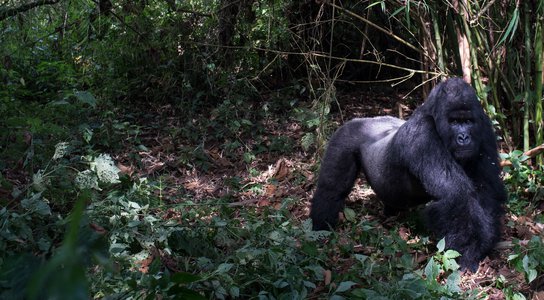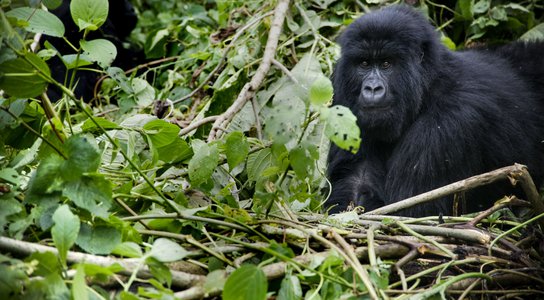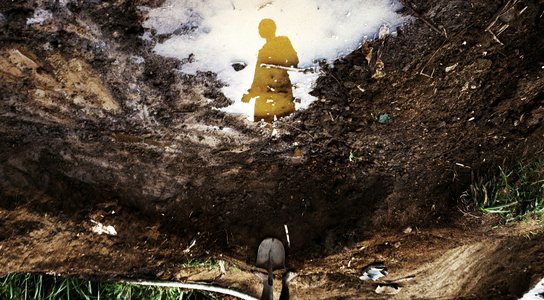May 2013: Major Burimba Feruzi filmed by undercover camera offering $3000 bribe to a senior park ranger in attempt to have “an accomplice on the inside”.
15 July 2013: Coalition of NGOs condemns “intimidations, arbitrary arrest, and torture of local community members opposing oil developments in Virunga National Park”, saying the “perpetrator” is Feruzi.
26 July 2013: Soco responds to the NGO statement, saying that it is “aware of the allegations” and intends to “investigate these allegations thoroughly”. Soco subsequently removes its response from its website.
15 April 2014: Chief warden of Virunga park Emmanuel de Merode is shot by unknown gunmen after returning from Goma where he had deposited a dossier on Soco’s activities.
16 April 2014: Soco issues statement denying involvement in the attack on de Merode.
17 April 2014: ‘Virunga’ debuts at Tribeca film festival. Footage of Feruzi offering the $3000 bribe is subsequently seen by audiences and Soco.
23 April 2014: Soco says it will start seismic testing in Virunga.
24 April 2014: Soco issues a response to the ‘Virunga’ documentary to the BBC. Soco says the film misrepresents its activities and “insists that it is fully informed of all activities on the ground by its representatives and that its operations are monitored closely.”
30 April 2014: Soco pays Feruzi $26,650. Feruzi’s note of receipt says the money was paid by Mr Damas [Vunabandi] and is to be used to pay soldiers’ salaries for April and per diems for May.
2 May 2014: Soco tells independent investigators hired by its shareholder Aviva that Feruzi has ‘no “role for Soco”’. Full quote from the repot: “SOCO has made it clear…that while Major Feruzi ‘is the person who was given the responsibility of liaising with our local company officials to ensure their own security whilst they were present in the area, he has no “role for SOCO”.’” (“SOCO International’s activities in DR Congo (Block V)”, Eiris, 5 June 2014, p.15).
12 May 2014: WWF staff and members of civil society receive threatening calls and text messages related to their campaigning against oil activities in Virunga.
13 May 2014: Soco denies any involvement in threats to activists.
15 May 2014: Feruzi is paid $15,600 by Soco. Feruzi’s note of receipt acknowledges payment from Damas Vunabandi, but does not explain what the money is for. This brings the amount paid to Feruzi by Soco to $42,250 in barely two weeks.
27 May 2014: Global Witness writes to Soco with 20 questions about its activities in Virunga, including “What payments and benefits – if any – have Soco, directly or indirectly, given to Major Feruzi?”
29 May 2014: A Soco spokesperson meets Global Witness to respond to the questions. The spokesperson says: “He [Feruzi] hasn’t received money from us… We wouldn’t allow that and the books haven’t revealed that he has.”
30 May 2014: Soco issues a statement to Human Rights Watch calling various allegations of bribery and intimidation “false and inaccurate”. It adds: “It also increasingly seems to be the case that anyone engaging in alleged questionable and unethical conduct are immediately branded ‘SOCO representatives’ and ‘SOCO supporters’ even when they simply are not and have nothing to do with our company.”
4 June 2014: Soco responds in writing to Global Witness’s questions of 27 May (see above). The company avoids directly answering the questions but does say that it “condemn[s] the use of violence and intimidation” and that it “categorically denied” breaching UK bribery laws.
13 June 2014: Soco completes seismic tests in the park. Soco continues geological studies inside Virunga National Park until 22 July.
6 September 2014: The Telegraph publishes an article about Soco in Virunga. The article reports local claims, backed up by Human Rights Watch, that soldiers guarding Soco’s base killed two fisherman in April after they allegedly opposed oil activities. Soco’s deputy chief executive Roger Cagle vehemently denied responsibility for these actions to the Telegraph, saying that the soldiers were “not associated with Soco. They’re assigned to us. We can’t tell the army to go and kiss off”.
12 March 2015: In its preliminary 2014 results statement, Soco announces that it appointed its own solicitors Clifford Chance “[i]n the summer of 2014” to look into the “allegations of wrong doing made by various NGO’s [sic] and media members”. The terms of reference for the review are not public and Soco has made no commitment to publish the results.
13/14 March 2015: The BBC broadcasts testimony from a fisherman at Soco’s Virunga base who says, “I found myself face to face with a boat belonging to Soco, and then a white man on board took a pair of scissors and cut my fishing net, even though he could have just let me through. So I asked him why he had cut my net, and then he called a speedboat full of soldiers. They started hitting me. They punched me and whacked me with their paddles.” The same radio piece presents an interview with a Congolese soldier who says he guarded Soco’s installations. “[M]y commander said that we had to work with the people from Soco,” he says. “We would secure the lake, and then when we finished the month only Soco would pay our salaries, not government.” He says the money from Soco, $150 a month, was more than his usual government salary. He says the man who paid him, via Feruzi, is called Pieter Kock. Kock was a Soco contractor employed through South African security firm Specialised Security Consultants. Soco’s response, as reported by the BBC, was to say that it has never paid Congolese soldiers, directly or indirectly, and that the government paid them in the usual way.
A PDF of the chronology available is here.
You might also like
-
Briefing Virunga: UK company bankrolled soldiers accused of bribery and violence in quest for oil in Africa’s oldest national park
AGM scandal for British company at centre of Leonardo DiCaprio-backed Oscar-nominated film.
-
Report Virunga
The battle to protect Africa's oldest national park.
-
Campaign Democratic Republic of Congo
The Democratic Republic of Congo (DRC) has an immense wealth of natural resources. But instead of driving development, these riches are benefiting predatory elites, armed groups and cowboy firms.